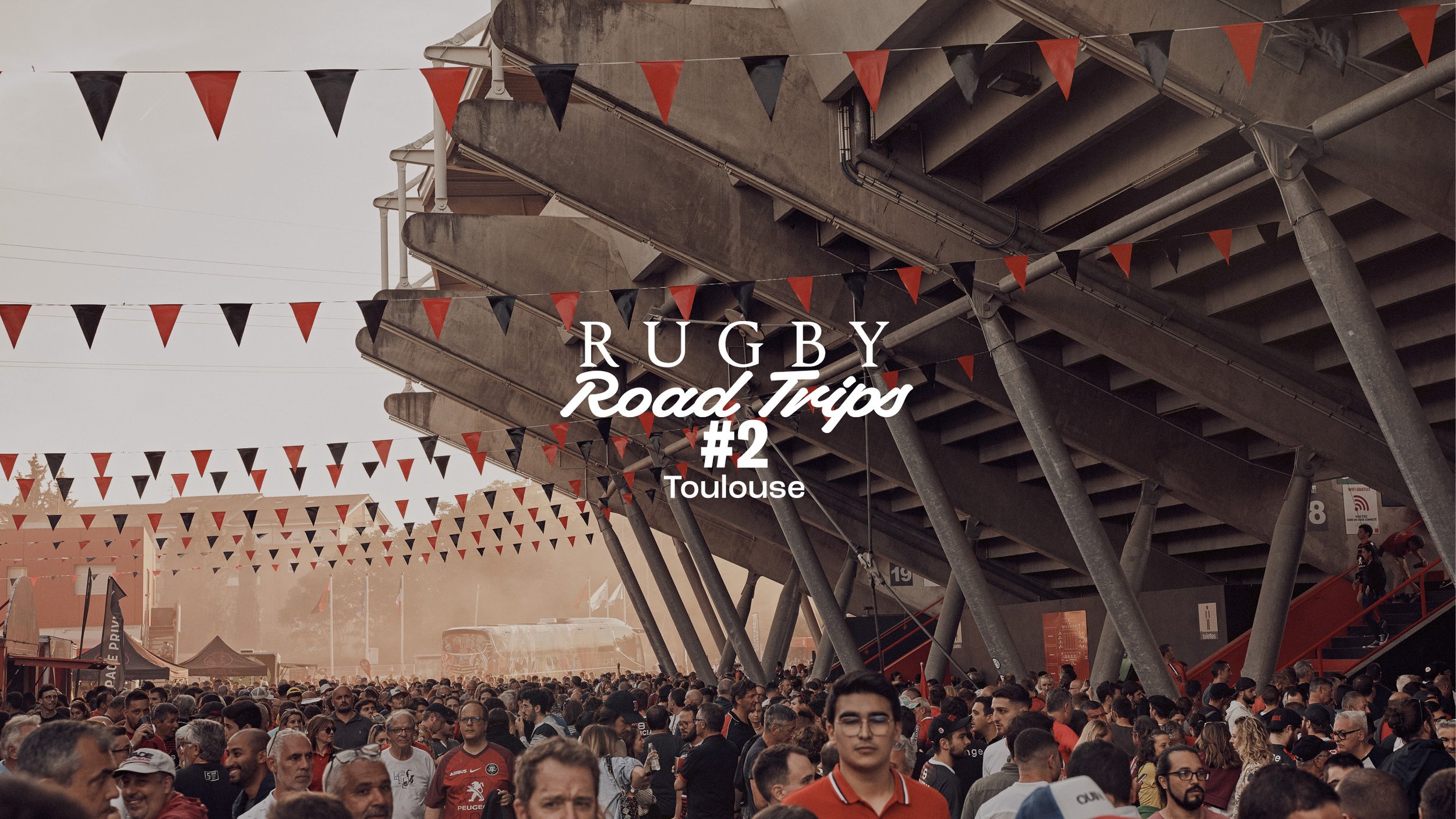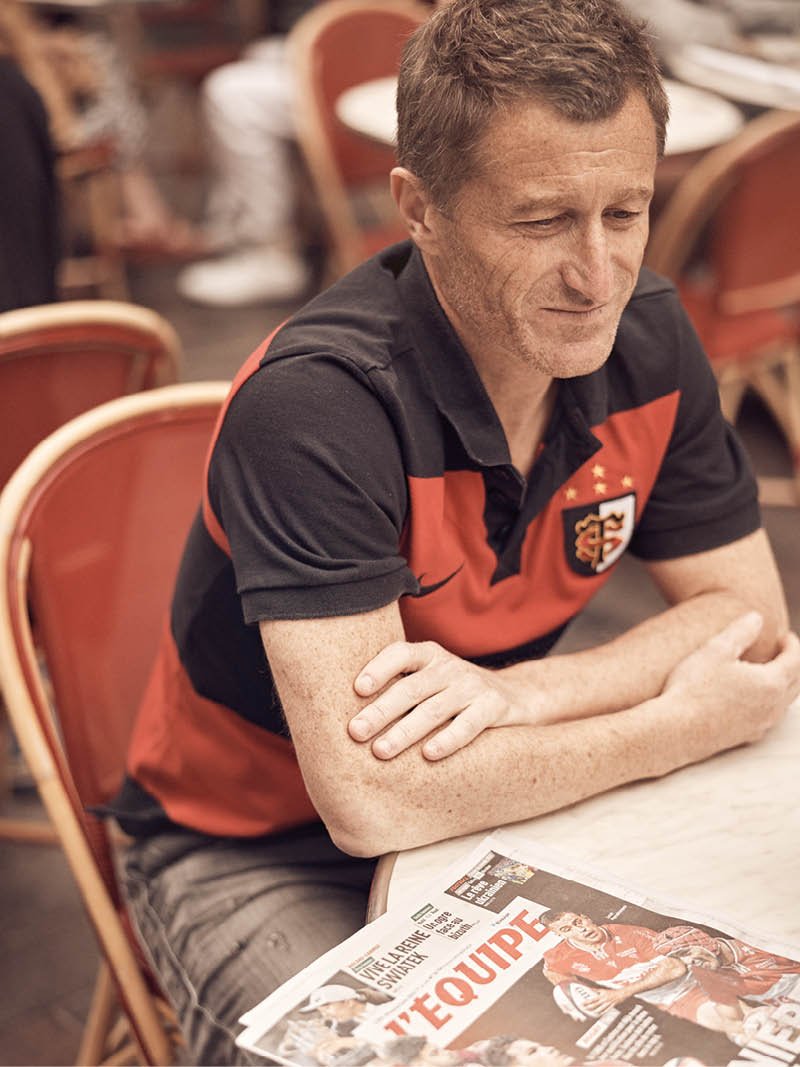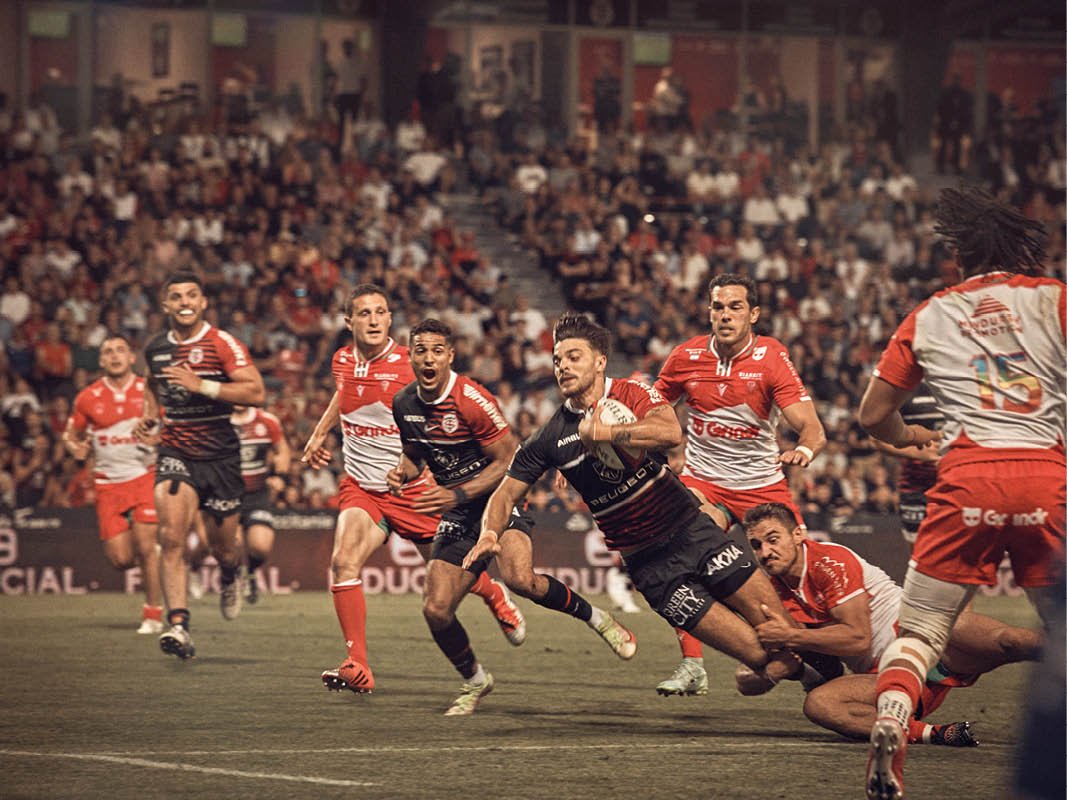
On a pilgrimage route through southern France into Spain, many stop in the ‘Pink City’ of Toulouse, where ancient relics of saints are left for safekeeping, town squares are paved with bronze, everything duck is king, and 6ft 6in locks take goal kicks from the touchline.
Last year, almost 200,000 people completed the Camino de Santiago, the pilgrimage to the famed apostle’s final resting place in Santiago de Compostela, a Galician town in the north-western corner of Spain. Of the assorted routes you can take, one snakes west across the south of France from Arles, north-west of Marseille, before eventually sloping down towards the Spanish border. Naturally, 2000-year-old Toulouse is a popular stop. Pilgrimages have surely ground to a halt when they’ve arrived in the duck-loving, fourth-largest French city that wears its history proudly on its rose-hued sleeves.
It’s a city that anyone from the south-west of France and beyond is drawn to, and has been drawn to, for millennia. From the east they come from the Mediterranean via the Canal du Midi; from the south, they follow the Garonne north from its origins in the Aran Valley of the Spanish Pyrenees; and that same river would bring them from the Atlantic coast, taking in Bordeaux en route.
Basilique Saint-Sernin, in the heart of the city, is almost as old as Toulouse, consecrated before the turn of the eleventh century but with origins at least six or seven hundred years previous. It’s where people seek out artefacts from Charlemagne, come to see Romanesque masterpieces, to take in relics of Saint-Sernin – the first bishop of Toulouse – and to visit the chapel of St Thomas Aquinas, one of Catholicism’s great thinkers whose tomb also resides in the city.
Of course, should any pilgrims also be followers of rugby, the floor mosaic within the chapel might be familiar: a serif T with an S wrapping itself around it. “During the French Revolution, the relics of Thomas of Aquinas were brought here to be protected,” explains our guide Céline Gazel. “And they added this mosaic with the S and T to represent St Thomas, but the rugby club took the logo to represent rugby in Toulouse around the 1950s.
“I would say it’s almost a religion,” Céline says of rugby, “that’s how we feel about it in the city. When we have a final or semi-final, they show the match on a giant screen in the Place du Capitole and everyone in the city gathers. There’s no distinction, it’s every age, young, old, everyone is together behind their team, and the night is always long in the city centre when they win.”
The Place du Capitole, is a town square unlike any other. Two square hectares with a pink-brick building some 800 years old (albeit with a more ‘modern’ 1750s façade) as its focal point. And never are the half million people of Toulouse more focused around it than when the rugby team win. Which is fortunate, as they do, a lot: French champions on 21 occasions, European champions five times, French cup winners four times. Even as we go to print, the square – which together with the famed local pink stone, is engrained with some twenty tonnes of bronze – is bracing itself for another capacity crowd. Toulouse will surely win either the Top 14 or Champions Cup again this year, perhaps both, turning the Occitania city centre into a sea of red and black – not that it isn’t already.
A fifteen-minute walk west of the square, is Prairie des Filtres, a finger of green, coating the western bank of the Garonne river between two of Toulouse’s famed bridges, Pont Saint-Michel and the seven-arch Pont Neuf, the city’s oldest dating back to the sixteenth century.
It was in the riverside meadow that is now Prairie des Filtres that students, many of them studying to be vets, gathered to play the first form of rugby in the region before the turn of the nineteenth century. Almost simultaneously clusters of rugby began to break out, both student bodies and locals alike forming their own societies and collectives, before coming together to form Stade Toulousain in 1907.
Some descendants of those rugby forefathers are surely wearing the red and black of Toulouse on the day we visit, for the final league fixture of their 2021/22 campaign against already relegated Biarritz.
On match days, they gather in assorted places across the city, including at Victor Hugo market, also a short stroll from the Place du Capitole. The market opens at 7am, and by mid-morning fans are gathering, despite the game not kicking off until 9pm. On tables outside, they’re sharing some of the market’s specialities, from wine and cheese to foie gras and saucisson. The charcuterie of Maison Garcia also makes it onto many pre-match snack lists. “This guy just asked me if I’ve got a donkey saucisson,” Louis Garcia, whose family run the stall tell us, “We don’t have that, maybe in Italy, but not in Toulouse.
“People in Toulouse are very proud of this market,” he continues. “It’s the biggest covered market in France, and my family have been here a long time. They crossed the border from Spain in the early 19th century because they were hungry and brought them with the knowledge to do this [he points to charcuterie].
“The food in Toulouse is all about cassoulet – a rich stew of white beans, confit duck and sausage – it’s the fish and chips of Toulouse. It’s very famous and there’s only three cities around the south-west of France where you can eat it, all within 20km. [Castelnaudary and Carcassonne complete the triumvirate].
“And of course, talking of duck, it’s like the capital of foie gras... although, see my friend over there,” says Louis, pointing to a stall with noticeable empty shelves, “he has no foie gras or duck this week, it’s empty, which is unusual. They had an illness and had to kill all the duck, and that’s sad. But it’ll be back soon, and that’s good because everyone comes here to eat foie gras and duck. We have so much duck, it’s much cheaper than anywhere else.
“Summer is coming now,” he adds, changing the direction of our conversation as a Toulouse-shirted group of fans walk by, “and that means we’re going out at 12pm, and not getting back home until 12am, with a rugby match in the middle.”
Louis describes Toulouse as a ‘village of half a million people’, and says the rugby team is part of the every day. “I see them [the players] once or twice a day, the trainer, and the president of the Toulouse too,” he adds. “When players don’t play, they come here in the morning, they’re very integrated into the city.”
Whoever we speak to, shares the same story. “It’s a passion, I’m born and raised here, I grew up with rugby, I practised at school, rugby is like a heartbeat, it’s like a religion, I wear red and black,” says Marine Gill, who works at La Bibent, the city’s oldest [it opened in 1823], and most spectacular restaurant on the Place du Capitole. Its huge vaulted ceilings are adorned with artwork, making for the most grandiose of settings. “It’s a way of life, it’s a victory for us, it’s a way to connect people, connect generations, grandfather with kids, it makes me emotional just to talk about it – you have to go there to feel it.”
There’s a short walk to the 19,000-capacity Ernest-Wallon Stadium, even after you take the shuttle from the nearest metro station. It takes you along a canal path, with a swing-bridge helping you cross the water.
Fans gather early, but given the culinary offering – including foie gras burgers and sausages, seemingly sold by the metre – who wouldn’t want to have supper at the club? There are walls covered in the names of fans who helped financially through covid: they seem to number in their hundreds, if not thousands.
With the play-offs looming and their place in the knockout stage confirmed, this game is one of celebration, particularly of the careers of Samoan lock Joe Tekori, who’s been with the club for almost a decade, and Maxime Médard, the French full-back born in the city and part of the rugby side for more than twenty years, having played part of his junior days here too.
To commemorate their departure, on every seat is placed a face mask of both Joe and Max allowing the fans to play tribute. In the post-covid era, these are masks the Toulousain are happy to wear.
As the sun begins to set around the stadium, even though it’s far beyond the reach of any glow from the city centre’s famous pink bricks, it’s still basked in a pinkish hue. The soundtrack to this idyllic setting though is far from tranquil, as the team bus arrives and mayhem ensues, as every man, woman and child – and their drum – moves in unison towards it, crowding them in a way that’s surely unheard of anywhere but in these French rugby hotbeds. Toulon, much further east, can perhaps claim to rival it, but surely not for a fixture which is effectively a dead rubber. Not that you’d know, as from the moment the players find the sanctuary of their changing room, every inch of concrete in the stands is covered with the red and black, giant flags waving and drums and trumpets dotted throughout, yet always in unison. The stadium resonates with the orchestrated atmosphere, shaking with the bang of drums, the stomp of feet and occasionally broken with the shrill ‘Pasodoble’ trumpet – the playing of which first found its way into rugby stadium the world over via places such as Toulouse, near to the Spanish border, from where the tune first came.
And listening to it here, played amid a fandom so fervent, every club or international side that has stolen the routine since, should consider handing it back, they’re just never going to do it justice.
The noise is relentless, easily reaching match action levels, an hour before kick-off and it’s just as well, as the game is little more than a training session for Toulouse, as they roll over Biarritz 80-7, allowing for both Médard and Tekori to get on the score sheet – scoring one apiece as part of the twelve try-rout. Perhaps even more impressive was that 6ft 6in, 130kg Tekori – who had played 246 games for Toulouse – was allowed to take two conversions, including one from the touchline. He nailed them both.
At the final whistle, the Tekori and Medard face masks are flung from all corners of the stadium in tribute, as the players gather for their long goodbyes. The fans linger long too, continuing their soundtrack unabated until Tekori addresses the crowd in French.
RC Toulon fans show their passion
The players don’t want to leave, Tekori certainly doesn’t, knowing it brings an end to his Toulouse days. Even though the play-offs await, he’d not featured in the starting line-up in the run-up, so this was probably his last chance to say goodbye. “The captain Jules [Julien Marchand] – always calls me Tom Tom, which means uncle in French – he asked me to say something to the team before in the changing room,” explains Joe, when we speak to him after the game. “I started crying when I was talking and I think that got everybody ready to rumble; they saw me in tears and thought, ‘we’re going to kill this game’.
“I said to them, ‘this game is not for me, even though we’re going to finish with my brother Max Medard, this is about putting your body on the line for each other. I’m going to give all my strength, everything to this game, and if you guys follow me, we’ll win this game’.
Racing 92 vs RC Toulon at La Défense Arena
“I could see around the changing room everyone had the French angry face on, they were ready to go. Then, hearing the ‘Allez Allez’, we went from kick off.”
At 38, Joe Tekori, who’d also spent six years with Castres, since arriving from Auckland in 2007, was definitely done. “I didn’t play much that last year,” he admits. “And I decided for myself and my family it was better to stop than carry on. The worse thing was training, especially at Toulouse where they’re training hard, for me to be doing that now – I’m 39 now – fitness every day... it was time to stop.”
He ensured he went out on a high. “I knew that was going to be my last game,” he says. “The coach came to see me and said, ‘this is your game’. I hadn’t played for three or four games before that, I’d been on the bench but I told him, ‘you’re letting me lead the team, I’m playing, I’m going to die out there on the field for you today, I’m going to empty the tank, give it a 110 per cent – for my family, for the boys, for Toulouse. I gave it all.
“It wasn’t all about me, it was about the team, the people around, if you ever go into this game thinking you’re a superstar, it’s not going to work for you – you can’t win a game without your team around you.”
That said, with two kicks and a try, he certainly grabbed the headlines. “Ha, yeah, it was good,” he admits. “I scored a try, kicked from the touchline – people never thought I’d do that. I think I shocked a few people.”
Joe Tekori arrived as the changing of the guard began at Toulouse. After back-to-back Top 14 titles in 2011 and 2012, which included a Champions Cup double in 2011, they were about to begin a barren spell that would not be broken until 2019. “You know, when I arrived in Toulouse, it was a big team, with a lot of big players, with Thierry Dusatoir the French captain... they were all there when I arrived, and I’m trying get involved in the first team and it was pretty hard to do that with all those old players.
“But now there’s a new generation, with a different way, and they were pretty fast at realising their own potential...”
Bay views at Île de Porquerolles
The 2019 Top 14 title was followed with another in 2021 – effectively back-to-back given the cancellation of the 2020 season – which was accompanied by a Champions Cup final win, 22-17 against La Rochelle at Twickenham. Joe’s enduring career, meant he could witness first-hand something he’d only seen from afar at rivals Castres. “When I was playing for Castres I’d see videos of Toulouse celebrating a title win with the [Top 14] shield in the Place de Capitole and seeing how many people there were there, but when I got to experience it for real, it was phenomenal, amazing,” he says. “You can’t hear what you’re saying to your brother next to you, they’re all singing ‘Toulousain’, there’s all the red flags.
“I can’t even talk about,” he admits, “I’ve just never seen anything like this, especially coming from a small island in Samoa, for me to be able to see these things... It’s the same for all the islanders, from Fiji, from Samoa, when they see these things,” he continues. “The emotion you get, it’s just so different from what we know – you’ve seen things like this on YouTube or social media, but when you see it in real life ... it’s so emotional, especially as I’ve been living here for a long time, Toulouse is in me...”
So much so that, despite reports linking him with other clubs, he was never going to leave Toulouse, even after retiring. He’s now coaching the next generation. “I’m just sharing my experience with these young boys,” he says. “I’m telling these boys every game it’s not about you, me, or anybody else, it’s about us, here. Look at each other, we’re like a family.”
Few players embody that ethos more than Joe, who also brought his own culture from the Pacific to Toulouse. “Every year before we start the season again, we always have a day with all the players’ partners and families,” he says, “and we have an umu, it’s a Samoan style way of cooking pigs on hot rocks...
“I think the Tuilagi boys brought that to Leicester too,” he continues, “it’s so we can all get know each other before we play, especially the ones that have just joined. Those boys love what I’m doing with the pig. Then we have a bouncy castle for the kids, the barbecue, it’s a proper family day and brings us altogether.”
Joe has two boys, both born in New Zealand, even though the younger – Breston, now thirteen – arrived while he was playing in France. “My wife was scared to give birth in France with a language she didn’t understand,” he explains. “When I announced I was retiring, Breston cried.
“We’d had a family meeting to talk about it all, but he was so upset. He plays rugby for Toulouse already and said, ‘Daddy, I’m going to continue to play for Toulouse in your name’. He wants to be like me! My whole family loves it here, our house is here, the kids and wife love it here, they don’t want to go home.
“Yeah,” he concludes. “This club is very, very special, in my opinion. I think it means so much because everyone respects the jersey, and when they put it on, it’s all about the pride, the respect.
“Everyone in this city loves rugby, it’s the city of rugby.”



















